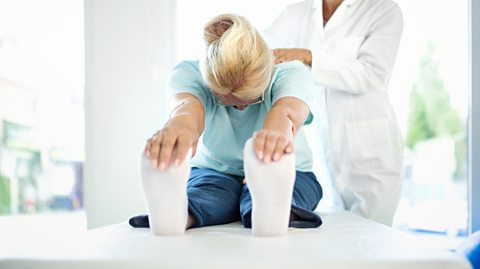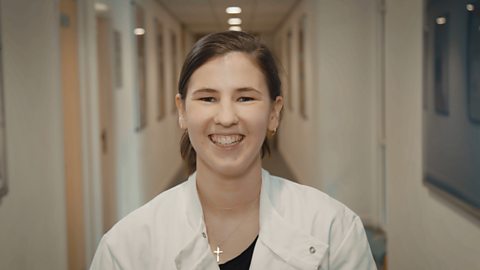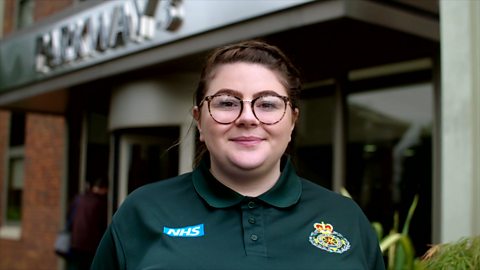Meet Amy, who works alongside occupational therapists to help ill, injured or elderly people to be as independent as possible. Part of our Bitesize world of work series.
Hi, my name's Amy, I'm from Oldham in Greater Manchester and I'm an occupational therapy technical instructor.
Occupational therapy in our department is, it's our responsibility to assess the functioning of patients that get referred to us. So, we look at things like fine motor skills, which is anything that we do with our hands and fingers, so, fastening buttons, using a pen or a spoon. We also look at gross motor skills, so that's how somebody walks, if they can climb stairs, if they have any balance issues, and we then tailor a treatment plan to those individuals, so that we can help them to live as independently as possible.
About three years ago, I became unwell myself with my mental health and I had a lot of input from an occupational therapy team and, before then, I didn't have any idea what occupational therapy was and I saw just how amazing the treatment had done for me, so I thought, you know, it's been a huge positive impact on my own recovery, I'm going to have a look into everything that they do. So, I did a bit of research, had a look into occupational therapy and then I actually looked at volunteering within an occupational therapy team and worked within the one that actually looked after me and I just fell in love with it from there and it was, yeah, I just… everything about it, I just thought this is an amazing role and then I went on from volunteering to getting the paid role as an occupational therapy technical instructor.
My GCSEs that I took while I was at school was Art, Drama and Media Studies and then I went onto college to do Media Production Technology because I always wanted to be a film director from being about 12-years-old and I was still following that pathway at those ages as well so I picked those to help me get into film technology – things I didn't really think played a part in the role that I have now but they definitely do because to be within our team, you need to have a very creative side so it really helped me with my creative side anyway.
When you're going through school, you'll always be told that you need your Maths and English and a lot of us at school used to always think: "when am I going to use maths? When am I going to use English?" not really thinking about it that much. And you do, you need maths and English so going into any job within the NHS, not just occupational therapy, communication is, you know, it's massive. You need to have good communication skills, non-verbally, verbally. We write a lot of notes for patients, we fill a lot of forms in.
The best part of my job is definitely seeing people smiling for the first time when they've not smile in months or if a patient stays for a whole therapy group when they've struggled with concentration for quite a while or the first time you have a proper conversation with a patient who's not been able to communicate with anyone for a long time. Just seeing them getting better and functioning a lot more to their own ability, it's amazing.
So, I think to be an occupational therapist, you need to be kind, caring, empathetic and compassionate. Within occupational therapy, you can be working across mental health, physical health or with people with learning disabilities and autism. So, you really need to be that kind and caring and compassionate person.
I work 37 and a half hours a week. We work across the seven days, so it could be anywhere between Monday and Sunday. I do four days on and then I do three days off. I always start at nine o'clock in the morning. Some days I will finish at five o'clock in the evening or seven thirty in the evening. They are really long shifts, especially over a short period of time of four days, but that really ties in with my family life and everything like that, so sometimes I have the weekend off, sometimes I have days off in the week where I'm able to be with my husband and my son, so it works really well.
So, some of the changes due to the pandemic – one of them is PPE (Personal Protective Equipment) – so, masks, we've had to, you know, we have to wear them the whole shift and that's been a big change, not just for us but for the patients. They can kind of be like a communication barrier sometimes, so masks have been really, really difficult to get used to.
I absolutely love working for the NHS, it's one of my biggest and proudest achievements. I absolutely love it when people ask me: "where do you work? Who do you work for?" and I get to say that I work for the NHS. I think it's a great organisation to work for. I think, across the NHS, no matter what role you work in, you really get a lot from it.
About three years ago, I became unwell myself with my mental health and I had a lot of input from an occupational therapy team… I thought, it's been a huge positive impact on my own recovery, I'm going to have a look into everything they do.

- Amy works for the Pennine Care NHS Foundation Trust in an occupational therapy (OT) team. OTs work with patients for many different reasons, such as helping them adapt after major surgery or helping patients with mental health difficulties or learning disabilities with everyday activities like work or volunteering
- Amy's department assess patients' functioning, such as fine motor skills (anything you do with your fingers or hands) and gross motor skills (like climbing the stairs or keeping your balance). They try to find solutions to help patients who are having difficulties live as independently as possible
- Amy started volunteering in an OT team after occupational therapy helped her recovery when she was struggling with her mental health. From her volunteering experience, she was able to apply for the OT technical instructor role when the vacancy opened
- Having worked across occupational therapy and nursing roles for the past two years and loved both, she recently secured a position in a new role called an apprentice nursing associate, which bridges the gap between registered nurses and nursing assistants
- She recommends volunteering as a great way to get a sense of exactly where your passion lies and which role could suit you best.

Occupational therapy technical instructors (aka occupational therapy support workers) assist occupational therapists. They will usually start on band 3 of the NHS pay scale. If they choose to, they could go on to pursue an Occupational Therapy degree or degree apprenticeship to become an occupational therapist. Occupational therapists usually start on band 5 of the pay scale. For more information on the two different roles, check out:

Occupational therapy (OT) technical instructor roles are sometimes referred to by different titles, including OT support worker, OT assistant, OT technician or rehabilitation assistant.
What to expect if you want to be an occupational therapy technical instructor
- OT technical instructor average salary: From £20,329 to £24,881 (Band 2-Band 4)
- OT technical instructor typical working hours: On average 40-42 hours per week
What qualifications do you need to be an occupational therapy technical instructor?
You could get into this role via a college course (such as a Level 2 or Level 3 Diploma, or a T-level - England-only), an apprenticeship, or applying directly if you have relevant experience.
Sources: LMI for All, National Careers Service, NHS Health Careers, GOV.UK.
This information is a guide and is constantly changing. Please check the National Careers Service website for the latest information and all the qualifications needed and the GOV.UK website for more on T-levels.
For careers advice in all parts of the UK visit: National Careers Service (England), nidirect (Northern Ireland), My World of Work (Scotland) and Careers Wales (Wales).

Sarah: occupational therapy assistant
Sarah specialises in neurosciences and works with patients who have injuries and brain tumours.

Becky: prosthetist. video
Becky helps people who are missing limbs or whose limbs need support.

Job inspiration: Careers in healthcare and frontline services. collection
Hear from people working across the healthcare sector and in frontline services, including some roles you may not know existed!
